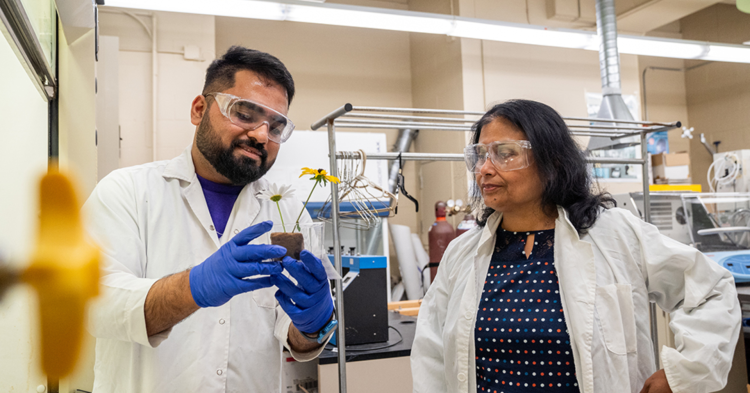With a focus on solving real-world problems, researchers at the WesternWater Centre are designing innovative projects that have a tangible impact on public health and environmental management.
The global water market is valued at more than $700 billion and growing annually. Ontario has emerged as a global leader in water technology research and development, home to over 900 water industry companies, 300 early-stage technology developers and 100 technology incubators. Many of the world's top water companies have chosen the province as their research and development hub, leveraging partnerships with academic institutions and research centers.

The WesternWater Centre advances research on sustainable water management, treatment technologies and environmental protection. (L to R) Glen Dsouza, a biochemical engineering PhD student who has developed a biodegradable super-adsorbent foam and Mita Ray, director of the WesternWater Centre and professor of chemical and biochemical engineering. (Jacob Arts/Western Engineering)
Recognizing this opportunity, Western launched the WesternWater Centre (WWCTR) to advance research on sustainable water management, treatment technologies and environmental protection.
"The WesternWater Centre was created to harness the collective expertise of our researchers and empower highly qualified personnel to tackle the world's water challenges," said Mita Ray, director of the centre and professor of chemical and biochemical engineering.
"Our collaboration across disciplines and access to funding and industry connections allow us to push the boundaries of water technology."
The centre's multidisciplinary approach - with researchers across faculties - opens doors to new solutions and partnerships in the water sector, Ray said.
"Water is an essential resource, and the research we conduct has far-reaching impacts not only in Canada but globally," she said. "By working closely with government agencies, industry leaders and technology innovators, we aim to create sustainable solutions that benefit both the environment and society."
Since its inception, WWCTR has made significant strides in research that addresses critical issues around water resources, treatment technologies and environmental sustainability.
Using wastewater to track public health
Mechanical and materials engineering professor Christopher DeGroot and his team have been on the front lines of a unique initiative - using wastewater to monitor respiratory viruses such as SARS-CoV-2, influenza and RSV. Their research, which spans 107 sites across Ontario and covers 26.2 per cent of Canada's population, helps track the spread of viruses without relying on traditional clinical testing.
"Wastewater surveillance offers a vital alternative for understanding the prevalence of diseases in a community," DeGroot said. "Our data help public health officials make informed decisions, such as when to recommend booster shots or increase protective measures."
By sampling wastewater from treatment plants and hospitals in cities like London, Ont., Sarnia, Ont. and Simcoe, Ont., DeGroot's team contributes valuable insights to guide community responses, particularly for vulnerable groups such as the elderly.
"Our goal is to provide real-time health data to reduce risks and ensure that everyone can make safer choices," DeGroot said.
Transforming waste into valuable resources
Turning waste into a resource is the mission of chemical and biochemical engineering PhD student Glen Dsouza. Under the mentorship of professors Mita Ray, Anand Prakash and Charles Xu, Dsouza has developed a biodegradable super-adsorbent foam derived from a byproduct of the pulp and paper industry known as Kraft lignin (KL).
"These super foams are versatile and environmentally friendly," Dsouza said. "They can be used for seed germination, floral arrangements and even to remove contaminants from various effluents."
One of the most exciting aspects of this research is the foam's ability to capture and recover phosphorus - a critical nutrient for agriculture.
Dsouza's work has been recognized with several prestigious awards, including a second-place finish at the Society of Plastic Engineers (SPE) conference and the E.G.D. Murray Scholarship in Biochemical Engineering.
"It's rewarding to see how sustainable materials can help us address environmental challenges while contributing to the circular economy." - Glen Dsouza, chemical and biochemical engineering PhD student
Building climate resilience
Civil and environmental engineering professor Reza Najafi is tackling an equally urgent problem - managing the impact of extreme weather events like floods and droughts. By analyzing stormwater management practices in 11 global cities, including New York, Berlin and Melbourne, Najafi's team is gathering insights to improve urban resilience.
"Our research focuses on understanding how cities around the world are adapting to climate challenges," Najafi said.
"With this knowledge, we can develop guidelines to better protect communities from flooding and other climate-related threats."
The group's work extends to examining how climate change affects the safety of dams and other water infrastructures.
"Our goal is to make sure that these structures remain safe and effective under future climate scenarios," Najafi said. "Ultimately, this research will inform best practices for urban planners and policymakers worldwide."
Shared commitment to sustainable water solutions
Though their projects differ, all three researchers share a common goal: making a tangible difference in how communities interact with and manage water resources. From improving public health monitoring to creating sustainable materials and designing resilient infrastructures, the work being done at the WWCTR is not just academically significant but also practically transformative.
"It's incredibly fulfilling to see our research help communities protect public health and safeguard our natural resources," DeGroot said.
"That's what motivates us - knowing that we are contributing to a safer and more sustainable world."













